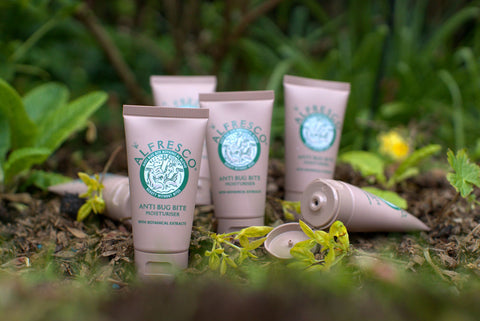How Does Insect Repellent Work?
It’s estimated that at any one time, there are as many as 10 quintillion insects alive in the world, which is a lot of bugs! This means that they can be pretty tricky to keep at bay, which is where insect repellents such as Alfresco come in, but how exactly does insect repellent work?

How They Work
Repellents come in a number of forms, such as sprays, lotions or creams and they essentially work to either make us undetectable or unattractive to the bugs, creating a temporary protective barrier (not to be confused with insecticides, which actually kill the insects). While repellents technically could kill insects at a high enough dosage, on the whole, they’re a much kinder way to get rid of insect pests, simply deterring them into flying away. Flies and other insects usually detect humans through indicators such as body heat, carbon dioxide emissions and odours and while some researchers believe that this is because the repellents block the odour receptors in the insects’ antennae, other think it might just be that they don’t like the smell! Either way, insect repellents help to protect your body from the bites, stings and scratches from the multitude of minibeasts out in the wild.
DEET
While all our repellents here at Alfresco are totally free of any artificial chemicals, one of the most commonly used ingredients in insect repellents is DEET (N,N-Diethyl-meta-toluamide). DEET was first developed during World War 2 by the US military, after their experiences in the jungles of the Pacific. It has long been considered to be the most effective insect repellent, but many people are unaware of some of the more harmful effects that DEET can also have. Not only can it act as an irritant, but it can also cause breathing difficulties, burning eyes and headaches too. It’s also worth noting that children are much more susceptible to the negative effects of DEET. It’s also been reported that DEET is no longer as effective as it was once thought to be. Recent research suggests that while mosquitoes and other insects are deterred at first, they soon start to ignore it. Researchers at the London School of Hygiene and Tropical Medicine conducted a test where they covered a human arm in DEET, which initially repelled mosquitoes, as expected. However, an hour later, they found that the same mosquitoes were far less bothered by the presence of DEET, showing that after their initial exposure, the flies simply adapt to the smell, making it much less effective.
Natural Repellents
On the other hand, our chemical-free Actives contained in our repellents here at Alfresco are made using 100% natural ingredients (100% natural sustainably sourced essential oils) Although obviously a secret blend Alfresco (Various ingredients such as citronella oil, lemongrass, tea tree oil and more have been used to create natural insect repellents and) We’ve spent years concocting our blend of over 20 natural essential oils Perfumes and lotions, moisturisers, including pure essential oils from all over the world, active ingredients such as cinnamon, patchouli and cedarwood to create the signature Alfresco fragrance. Using natural ingredients achieves the same results, but is also a lot safer, and they also don’t need to be reapplied as often as synthetic repellents. Ultimately though, our natural repellents work in much the same way as those containing potentially harmful chemicals, confusing their sense of smell and throwing them off your scent. However, unlike those repellents which use chemicals, natural repellents are totally safe to use, with no harmful side-effects for all ages, and they’re also much better for the environment too! Another great benefit of using natural ingredients is that the repellents smell much nicer than the chemical alternatives do. While chemical and natural repellents work in the same way, it’s important to think about the side effects that they can cause, both to you and to the environment.

Check out our insect repellent products here, including anti-bug bite fragrances and anti-bug bit moisturisers.
